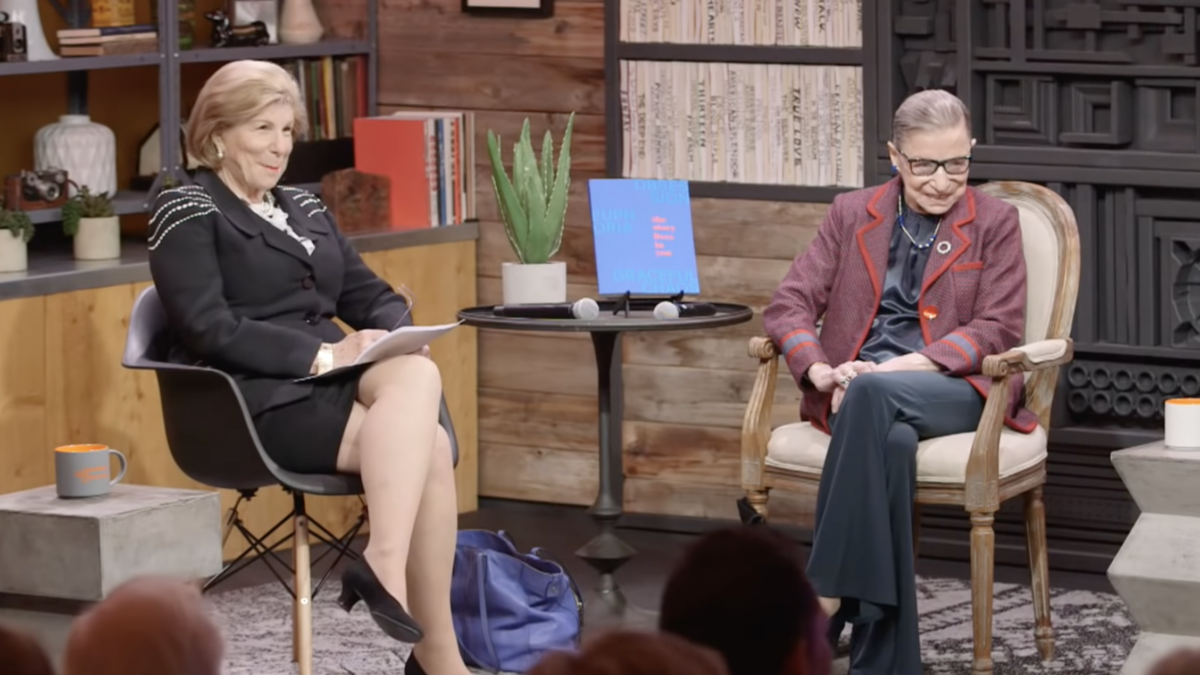Washington Post Editor Ruth Marcus recently criticized Justice Samuel Alito for having the audacity to give two interviews to The Wall Street Journal editorial page and publish an opinion article on these pages in the past few months defending himself from the left’s attacks on the Supreme Court, including on Alito specifically.
There is nothing remotely inappropriate about Alito’s actions, but Marcus writes, “There is something unseemly and unsettling about Alito’s repeated use of the Journal — part therapy couch, part bullhorn.” She added, “It’s hard to hold yourself out as a neutral umpire when you only play on welcoming fields.” If her comments were not so blindingly hypocritical, they would be funny.
Justice Ruth Bader Ginsburg repeatedly gave “interviews” to her extraordinarily close friend, Nina Totenberg, who just happens to be NPR’s Supreme Court correspondent, to talk about her life and jurisprudence, and to sell her books. In her recent memoir, Dinners with Ruth: A Memoir on the Power of Friendships, Totenberg discusses how she gave Ginsburg the questions in advance so RBG could be more expansive.
Totenberg wrote, “She and I performed well together; I’ve lost count of all the times I have interviewed her onstage,” noting how they sold out immediately. Totenberg makes references to how “a few of my Supreme Court reporter colleagues occasionally referred to these Ruth-chats with veiled criticism, whether I was the interviewer or not, seeing them as conversations geared towards her fans. People certainly didn’t go to the trouble of getting tickets to watch Ruth get skewered.” These interviews seem to more closely fit the bill of “part therapy couch, part bullhorn,” than Alito’s op-eds.
But Marcus seems completely unbothered by liberal Justice Ginsburg repeatedly working with Totenberg, a Supreme Court reporter whose entire job is to report objectively on the justices, to get her story out on “welcoming fields” and sell books to boot. (Ginsburg’s book is prominently displayed in one of the interviews in the hagiographic documentary RBG. Totenberg is listed in the film as simply an NPR reporter, and nary a mention of her friendship with Ginsburg.)
In fact, Marcus provided the following blurb for Totenberg’s book: “Outsiders think of Washington as a place of poisonous rivalries, not deep friendships. Nina Totenberg knows differently. ‘Dinners with Ruth’ is a spectacularly charming account of Totenberg’s five decade-long friendship with the celebrated justice. It is also something more — an inspiring love song to the imperative of lasting friendships and an instruction manual in how to nurture them.”
I appreciate and even encourage public officials to have working relationships, even friendships, with reporters. But when you are one of the justice’s closest friends, and your sole job is to cover her and the court, it does raise some serious ethical questions.
In fact, these staged interviews are the least of the revelations in this book about how a Supreme Court reporter did not just have a working friendship with Ginsburg but was one of her closest friends. For example, Totenberg’s husband, a doctor, served as a medical adviser to Ginsburg and her husband during significant periods, even supervising the biopsy that revealed two cancerous tumors in Ginsburg.
Here are some more revelations from Totenberg’s book, all of which have gone unremarked upon publicly, to my knowledge, by Marcus, who covered the court, or any Supreme Court reporters. “For nearly fifty years, Ruth and I had knit ourselves ever more tightly into the fabric of each other’s lives.” When Ginsburg’s nomination for the D.C. Circuit was stalled, Totenberg wrote an op-ed calling for her to be confirmed because “she was an extraordinary person who had done so much for women’s rights.”
Ginsburg’s husband Marty asked Totenberg to provide a letter as “one of her closet friends” for an album he was putting together for RBG’s 50th birthday. Ginsburg also “meticulously planned” Totenberg’s second wedding and performed the service. After the passing of Totenberg’s first husband, Ginsburg “seemed to always have an extra ticket to take me to a performance or an extra seat at the table for dinner out, and please would I come. It wasn’t asked as a question; it was asked in a way I couldn’t say no.”
Totenberg discusses how she would “interview” Ginsburg at her parties with people gathered around: “I could show her off, while she in turn could reveal bits about herself and be quite funny.” And of course, following the book’s title, Totenberg and her husband regularly hosted Marty and Ruth Ginsburg at their home for decades, and after Marty’s passing Justice Ginsburg nearly every Saturday evening for dinner for many months during Covid. “Sometimes when we knew she was working very hard, especially during the last month of the Court’s term, David and I would all but insist that she could take an hour off if we brought dinner. … After she took her last bite, we would scoot her upstairs to work while we cleaned up, and quietly let ourselves out.”
And it becomes readily apparent that Totenberg knew a whole lot more about the health of Justice Ginsburg than she let on to the American people. She reveals that she cut short one interview at Lincoln Center because she looked in Ginsburg’s eyes and knew something was wrong. She adds that her husband “knew the truth” and that he had supervised the biopsy that revealed Ginsburg had two cancerous tumors.
Totenberg also discloses that Ginsburg would ask her what she thought of various exchanges from an oral argument and also appeared to have shared with Totenberg some exchanges from the confidential conferences the justices held regarding cases.
Totenberg discloses how she was the emcee for an event at a partisan Democrat Women’s club where Ginsburg was given the Eleanor Roosevelt award but, of course, never reported on what appears to be a breach of judicial ethics. If this were Alito getting an award from the Republican National Committee, Totenberg would be breaking this story and talking about the politicization of the court, with Ruth Marcus criticizing it too. Does “nurturing” a friendship with a person you cover for work also require ignoring ethical transgressions?
Marcus’ selective outrage is revealing and shows the rot in American journalism. She praises Totenberg for a book that puts on full display a way-too-cozy relationship between a Supreme Court justice and the dean of the Supreme Court reporters and has no problems at all with these massive conflicts of interests, yet skewers Alito for defending himself in The Wall Street Journal opinion pages.
Marcus wants you to think Alito is acting inappropriately in defending himself because she wants to undermine the American people’s trust in the Supreme Court now that it is no longer implementing left-wing policies. Marcus must be called out for this dangerous propaganda.









